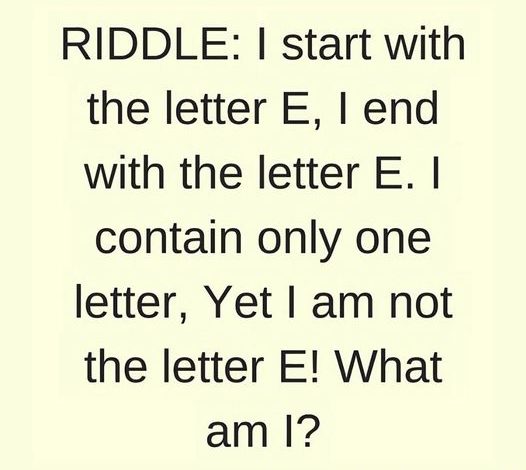
ADVERTISEMENT
**”The Art of the Riddle: How Simple Puzzles Can Sharpen Your Mind”**
ADVERTISEMENT
Riddles have been a part of human culture for centuries, captivating minds with their blend of simplicity and complexity. At first glance, they may seem like simple wordplay, but riddles can actually offer deep insights into the way we think, process information, and solve problems. The riddle in the image is a perfect example of how a few words can challenge our perception and push us to think creatively.
**The Appeal of Riddles**
What makes riddles so enduringly popular? For many, it’s the thrill of the challenge—the satisfaction that comes from cracking a puzzle that seems impossible at first. Riddles require us to step outside of conventional thinking and approach problems from new angles. This process of creative problem-solving is not just fun; it also exercises our cognitive abilities, helping to keep our minds sharp.
**The Psychology Behind Riddles**
Riddles engage several cognitive processes, including lateral thinking, pattern recognition, and deductive reasoning. When faced with a riddle, our brains work to identify patterns and connections that aren’t immediately obvious. This type of mental exercise can improve our ability to solve complex problems in other areas of life as well.
ADVERTISEMENT
**The Cultural Significance of Riddles**
Throughout history, riddles have been used in various cultures as a form of entertainment, education, and even as tests of wisdom. In ancient times, they were often posed by storytellers or as part of oral traditions, challenging listeners to think deeply and engage with the narrative. Riddles were also a common feature in folklore, used to convey moral lessons or to highlight the cleverness of characters.
**Riddles in Modern Times**
In today’s fast-paced, technology-driven world, riddles offer a rare opportunity to slow down and engage in thoughtful contemplation. They provide a welcome break from the constant stream of information, allowing us to focus on a single challenge. Whether shared in person or through social media, riddles continue to bring people together, sparking conversations and encouraging collaborative problem-solving.
**How to Use Riddles to Sharpen Your Mind**
ADVERTISEMENT
Incorporating riddles into your daily routine can be a fun and effective way to keep your brain active. Start your day with a riddle to wake up your mind, or challenge friends and family to solve one together. You can also use riddles as a teaching tool, helping children develop their critical thinking skills in a playful and engaging way.
**Conclusion**
Riddles may seem like simple word games, but they offer much more than just entertainment. By challenging our minds to think in new and creative ways, riddles help us develop important cognitive skills that can benefit us in all areas of life. So the next time you encounter a riddle, take a moment to appreciate the mental workout it provides—and enjoy the satisfaction of finding the answer.
—
This article could be featured in an educational blog, a mental wellness website, or a general interest magazine. It ties the simple pleasure of solving riddles to broader cognitive benefits, making it relevant to a wide audience.
ADVERTISEMENT




